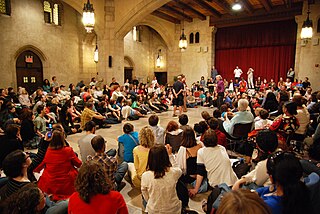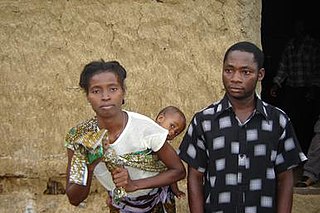Related Research Articles

Augusto Boal was a Brazilian theatre practitioner, drama theorist, and political activist. He was the founder of Theatre of the Oppressed, a theatrical form originally used in radical left popular education movements. Boal served one term as a Vereador in Rio de Janeiro from 1993 to 1997, where he developed legislative theatre.
A happening is a performance, event, or situation art, usually as performance art. The term was first used by Allan Kaprow during the 1950s to describe a range of art-related events.
Community theatre refers to any theatrical performance made in relation to particular communities—its usage includes theatre made by, with, and for a community. It may refer to a production that is made entirely by a community with no outside help, or a collaboration between community members and professional theatre artists, or a performance made entirely by professionals that is addressed to a particular community. Community theatres range in size from small groups led by single individuals that perform in borrowed spaces to large permanent companies with well-equipped facilities of their own. Many community theatres are successful, non-profit businesses with a large active membership and, often, a full-time staff. Community theatre is often devised and may draw on popular theatrical forms, such as carnival, circus, and parades, as well as performance modes from commercial theatre. This type of theatre is ever-changing and evolving due to the influences of the community; the artistic process can often be heavily effected by the community's socioeconomic circumstances.

Experimental theatre, inspired largely by Wagner's concept of Gesamtkunstwerk, began in Western theatre in the late 19th century with Alfred Jarry and his Ubu plays as a rejection of both the age in particular and, in general, the dominant ways of writing and producing plays. The term has shifted over time as the mainstream theatre world has adopted many forms that were once considered radical.
A political drama can describe a play, film or TV program that has a political component, whether reflecting the author's political opinion, or describing a politician or series of political events.
Applied drama is an umbrella term for the use of theatrical practices and creativity that take participants and audience members further than mainstream theatre. It is often in response to conventional people with real life stories. The work often happens in non-conventional theatre spaces and social settings. There are several forms and practices considered to be under the umbrella of applied theatre.
Theatre for development (TfD) is a type of community-based or interactive theatre practice that aims to promote civic dialogue and engagement.
The theatre games tradition is a method of training actors that was developed in the 20th century by practitioners such as Joan Littlewood, Viola Spolin, Paul Sills, Clive Barker, Keith Johnstone, Jerzy Grotowski and Augusto Boal. Theatre games are also commonly used as warm-up exercises for actors before a rehearsal or performance, in the development of improvisational theatre, and as a lateral means to rehearse dramatic material. They are also used in drama therapy to overcome anxiety by simulating scenarios that would be fear-inducing in real life.

The Theatre of the Oppressed (TO) describes theatrical forms that the Brazilian theatre practitioner Augusto Boal first elaborated in the 1970s, initially in Brazil and later in Europe. Boal was influenced by the work of the educator and theorist Paulo Freire and his book Pedagogy of the Oppressed. Boal's techniques use theatre as means of promoting social and political change in alignment originally with radical-left politics and later with centre-left ideology. In the Theatre of the Oppressed, the audience becomes active, such that as "spect-actors" they explore, show, analyse and transform the reality in which they are living.
Adrian Antony Jackson is an English theatre director, playwright, teacher and trainer.
The Lehrstücke are a radical and experimental form of modernist theatre developed by Bertolt Brecht and his collaborators from the 1920s to the late 1930s. The Lehrstücke stem from Brecht's epic theatre techniques but as a core principle explore the possibilities of learning through acting, playing roles, adopting postures and attitudes etc. and hence no longer divide between actors and audience. Brecht himself translated the term as learning-play, emphasizing the aspect of learning through participation, whereas the German term could be understood as teaching-play. Reiner Steinweg goes so far as to suggest adopting a term coined by the Brazilian avant garde theatre director Zé Celso, Theatre of Discovery, as being even clearer.
A theatre practitioner is someone who creates theatrical performances and/or produces a theoretical discourse that informs their practical work. A theatre practitioner may be a director, dramatist, actor, designer or a combination of these traditionally separate roles. Theatre practice describes the collective work that various theatre practitioners do.
Forum theatre is a type of theatre created by Brazilian theatre director Augusto Boal. It is one of the techniques under the umbrella term of Theatre of the Oppressed (TO). This relates to the engagement of spectators influencing and engaging with the performance as both spectators and actors, termed "spect-actors", with the power to stop and change the performance. As part of TO, the issues dealt with in forum theatre are often related to areas of social justice, with the aim of exploring solutions to oppression featured in the performance.
Theatre pedagogy is an independent discipline combining both theatre and pedagogy. As a field that arose during the 20th century, theatre pedagogy has developed separately from drama education, the distinction being that the drama teacher typically teaches method, theory and/or practice of performance alone, while theatre pedagogy integrates both art and education to develop language and strengthen social awareness. Theatre pedagogy is rooted in drama and stagecraft, yet works to educate people outside the realm of theatre itself.

O Meu Marido Está a Negar is a 2007 documentary film about a play of the same name, written and directed by Rogério Manjate. The film and play both discuss HIV/AIDS issues. Manjate directed the award-winning short I Love You, also concerning HIV/AIDS, the same year. The film's title means "My Husband is in Denial".

Teatro de Arena was a theatre in São Paulo, Brazil.[1] Established in 1953, it was one of the most important Brazilian theatre groups in the 1950s and 1960s. Its importance stemmed from the rising of Brazilian nationalism promoted by the Vargas era. It performed works by the likes of Renato José Pécora, Augusto Boal and Gianfrancesco Guarnieri, before closing in 1972.
Jennifer S Hartley is a Scottish fiction author, applied theatre practitioner and director. She is the author of the novel The Shadow Whisperer published 2020 to critical acclaim, Applied Theatre in Action: a Journey, as well as various plays, poetry, and other writings.
Claire Bishop is a British art historian, critic, and Professor of Art History at The Graduate Center, CUNY, New York where she has taught since September 2008.
Izaías Almada is a Brazilian novelist, playwright, and screenwriter. In 1963 he moved to the city of São Paulo where he worked in theater, journalism, TV advertising, and script writing. Between the years of 1969 and 1971, he was a political prisoner of the military coup in Brazil that took place in 1964.
Immersive theater differentiates itself from traditional theater by removing the stage and immersing audiences within the performance itself. Often, this is accomplished by using a specific location (site-specific), allowing audiences to converse with the actors and interact with their surroundings (interactive), thereby breaking the fourth wall.
References
- ↑ Boal, Augusto. 2000. Theatre of the Oppressed. 3rd ed. London: Pluto. ISBN 978-0-7453-1657-4
- ↑ Bishop, Clair (July 2012). Artificial Hells. London: Verso. pp. 122–123. ISBN 9781844676903.
- ↑ Bishop, Clair (July 2012). Artificial Hells. London: Verso. pp. 123–124. ISBN 9781844676903.
- ↑ Bishop, Clair (July 2012). Artificial Hells. London: Verso. p. 125. ISBN 9781844676903.
- ↑ Bishop, Clair (July 2012). Artificial Hells. London: Verso. p. 125. ISBN 9781844676903.
- ↑ Bishop, Clair (July 2012). Artificial Hells. London: Verso. pp. 106 & 108. ISBN 9781844676903.
- ↑ Wardrip-Fruin, Noah, and Nick Montfort. "'Happenings' in the New York Scene." The New Media Reader. Cambridge, Mass.: MIT, 2003. 83-88. Print.
- ↑ Boal, Augusto (1974). Tecnicas latinoamericanas de teatro popular. Buenos Aires: Ediciones corregidor. p. 111.